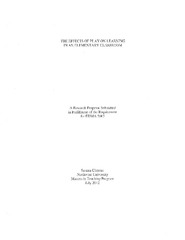The Effects of Play on Learning in an Elementary Classroom
Abstract
With the current educational trends towards standardized testing, competitive education and baby geniuses, play is making a quick exit out of the learning environment. Children in today’s society are expected to learn to read and write by the age of four. Their intelligence is being tested from the time they are born; society somehow, has forgotten that children are supposed to play. In this study I implemented a mixed research approach to examine the effects of play on a highly academic group of four and five year old students. During this time, I allowed students to play before some learning episodes and incorporated play into other learning episodes. I used the quantitative method to measure learning in the areas of reading, vocabulary and comprehension over time. The qualitative method was incorporated to measure the effects of play on students’ self-regulatory skills. During this time I found that play is most effective when integrated into the learning episode and students were invested in the learning. In this research the reader will find multiple examples from my own classroom in which play was integrated into the learning environment suggesting that play does affect student learning.
Original item type
PDF
Original extent
iv, 28 pages
Subject
Copyright
This original work is protected by copyright. Copyright is retained by the author(s). Works may be viewed, downloaded, or printed, but not reproduced or distributed without author(s) permission.


 Maintained by the Northwest University Library
Maintained by the Northwest University Library